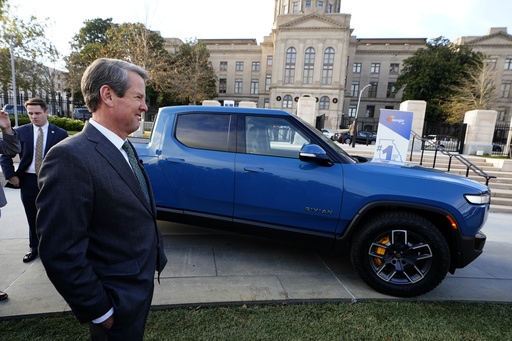
ATLANTA — The Biden administration revealed on Tuesday that the U.S. Department of Energy will extend a loan of $6.6 billion to Rivian Automotive, aimed at revitalizing a halted factory project in Georgia. This initiative comes as the electric vehicle startup has been facing challenges on its path to profitability.
It remains uncertain if the administration will finalize the loan before Donald Trump potentially resumes the presidency in less than two months, which raises questions about whether the Trump administration may attempt to reclaim the funding. Previously, Trump had pledged to eliminate federal tax credits for electric vehicles, which offer up to $7,500 for new zero-emission models and $4,000 for used ones. However, his position shifted somewhat after Tesla’s CEO, Elon Musk, became an ally and advisor.
Rivian gained significant attention when it went public and started manufacturing its larger electric R1 SUVs, trucks, and delivery vehicles at a repurposed Mitsubishi plant in Normal, Illinois, in 2021. Shortly thereafter, the California-based company announced plans for a second, larger $5 billion facility located approximately 40 miles east of Atlanta, in the vicinity of Social Circle.
These R1 vehicles are priced at $70,000 and upwards. The initial intent was to produce more affordable R2 vehicles, a smaller SUV for a broader market, in Georgia. The first phase of the Georgia factory was expected to yield 200,000 vehicles annually, with a second phase doubling that capacity. Ultimately, the facility was projected to create around 7,500 jobs.
However, Rivian struggled to meet its production and sales milestones, quickly depleting its financial resources. In March, the company announced a suspension of construction activities at the Georgia facility, opting instead to assemble the R2 SUV in Illinois in an effort to expedite its market entry, projected for 2026, while saving $2.25 billion in capital expenditure. Following this, Volkswagen AG announced a $5 billion investment in a partnership with Rivian, which entails sharing software and electrical technology. This financial boost alleviated Rivian’s cash-flow challenges.
Tuesday’s announcement reinstates hope in Rivian’s ambitions. The company has stated that the development of the R2 and the smaller R3 in Georgia is back on track. The financial assistance will be drawn from the Advanced Technology Vehicles Manufacturing Loan Program, which has a total of $17.7 billion dedicated to supporting low-cost loans for fuel-efficient vehicles and their components. In recent years, the program has predominantly focused on financing new battery factories for electric vehicles but has also been responsible for early-stage funding for successful models like the Tesla Model S and Nissan Leaf.
Established in 2007, this program mandates a “reasonable prospect of repayment” for any loans issued. U.S. Senator Jon Ossoff, a proponent of electric vehicle and solar manufacturing in Georgia, has praised the recent development as another significant federal investment in the state’s electric vehicle sector. In July, Ossoff had urged Energy Secretary Jennifer Granholm to lend support for this funding.
Georgia Governor Brian Kemp has expressed a vision for the state to become a hub for electric vehicle manufacturing. Nonetheless, he has experienced a challenging relationship with the Biden administration regarding industrial policies, despite studies indicating Georgia has attracted more electric vehicle investments than any other state. Kemp maintains that manufacturers were already favoring Georgia before the passing of Biden’s Inflation Reduction Act.
A spokesperson for Kemp previously stated that the governor advocates for a market-driven growth approach, criticizing the Biden administration’s methods for potentially favoring certain industries over others and disadvantaging local auto manufacturers. The loan to Rivian could potentially salvage one of Kemp’s key economic development initiatives, even as Biden’s term concludes. This scenario might place both Rivian and Kemp in a position where they would need to defend the loan should Trump attempt to cancel it.
In 2022, state and local governments provided Rivian with an incentive package valued at around $1.5 billion, with the deadline for completing required investments and hiring extended to 2030. There have been legal opposition from local residents against the Georgia site development.
The financial outlay from state and local authorities was anticipated to exceed $125 million for purchasing and clearing the nearly 2,000-acre site, of which much of the preparatory work is now complete. Furthermore, the state has nearly finished $50 million in promised road improvements. In contrast to Rivian’s setbacks, the Hyundai Motor Group is rapidly advancing with its $7.6 billion electric vehicle and battery plant located near Savannah, which is projected to employ around 8,500 individuals. The Korean automaker announced in October that production has already begun at this facility.
